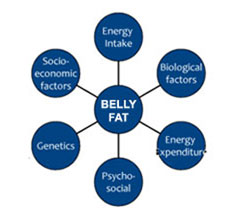Overcome Emotional Eating
Why do we eat? Well common sense tells us that we need to eat to nurture our bodies, we need to eat to satisfy physical hunger. In practice however, our behavior around food is far from this ideal.
Currently it is estimated that globally there are more that 1 billion overweight adults with at least 300 million of them being obese. Studies have shown that an alarming 75% of US adults were overweight or obese (source study carried out by a team at John Hopkins University in Baltimore). The obesity rate in the UK, Canada, and Australia is rapidly catching up to that of the USA. The World Health Organization describe obesity as a worldwide epidemic. Clearly something has gone terribly wrong.
People are simply eating too much and the wrong kinds of food. In the majority of cases, lack of nutritional knowledge is not the problem, on the contrary, overweight people tend to be experts in nutrition, they know exactly what they should and shouldn't be eating, many have an encyclopedic knowledge of the calorific, fat and carbohydrate values of their favorite foods, yet they continue to consume these same foods seemingly with abandon. Why?
Apart from eating to satisfy physical hunger, people also eat to satisfy an emotional craving. The term emotional eating encompasses a whole range of behavior around food and includes, eating to satisfy and particular emotion, eating as a distraction from something, eating as a habit, eating to feel in control, eating unconsciously and for subconscious reasons.
Emotional eating
It is natural to use food to make yourself feel better, in our society food has always been used in this way. Think back to when you were a child, were you ever offered a cookie or lollipop when you were upset? Eating our favorite food when we are feeling bad is a universal strategy that works every time. The only problem is it only works momentarily, literally, you only feel better while the food is in your mouth. And the kind of food we all turn to when we are feeling bad tends to be of the high fat, high sugar variety, which is obviously detrimental to our weight loss efforts. I have never heard of anybody gorging themselves on broccoli when they are feeling unhappy!
Emotional eating is also symptomatic of deep seated emotional baggage such as guilt, fear, loneliness and anger. This may require therapy to clear it. There are many therapies currently available such as hypnotherapy and cognitive behavioral therapy which enables the person to uncover the root of the problem and clear the emotional obstacles to weight loss.
Eating as a distraction
People also eat as a distraction from something, for example, using food to procrastinate, like eating instead of getting started on the report you need to write, 'I'll just sit down and have a cup of coffee and that donut and then I will get to work'. People will also commonly eat when they are tired instead of resting or sleeping, instead of getting affection, instead of smoking when they have given up, or because they are bored or even because they are excited and eating calms them down.
Eating as a control mechanism
People who feel they have little control over their lives, and this is common with people who suffer from low self esteem, can find themselves with an eating disorder because this is the one area of their lives where they feel they can exert control. The irony is, of course, that an eating disorder such as bulimia, anorexia or bingeing can very easily take over, so the sufferer no longer has any control over their eating.
Eating Through Habit
Most emotional eating is unconscious. The person is not aware of the subconscious reasons for eating, they simply feel compelled to do it. Much of the subconscious conditioning that causes people to over eat is based on childhood experience, habit and upbringing and has become integrated into their personality.
Becoming aware of habitual emotional overeating and the reasons behind those emotions is the first step on the road to conquering this destructive behavior. There are many strategies that you can employ to uncover your eating patterns and so deal with them.
Briefly, here are some tips to help you overcome compulsive eating.
1. Use a food diary. When you write down everything that you consume and what you were feeling at the time you will start to see patterns emerging. Awareness is one of the most important steps in overcoming emotional eating.
2. Therapy - either self-help or with a professional. If you have unresolved emotions such as guilt, anger, fear or low self esteem consider therapy to help you resolve these problems. Many dieters find hypnosis and hypnotherapy powerful therapies for clearing emotional baggage and any secondary gain issues. If you do not wish to see a therapist try self-hypnosis which can help you to re-program your subconscious with more helpful beliefs. CBT (Cognitive Behavioral Therapy) is also a highly effective therapy for reconditioning eating behavior.
3. Get organized. Organize your environment, very often a cluttered home or office can lead to cluttered thinking. Do you ever get the sense that you want to being a new weight loss and exercise program but you can't every get started? This may be because clutter is holding you back, have a good clear out and start fresh.
4. Set goals. The effectiveness of goal setting is well documented, it crystallizes what you are planning to achieve and moves from a vague hope to a concrete intention.
5. Change your distractors, instead of food try taking a walk, or knitting! Whatever works for you.
Once you have successfully dealt with emotional eating, weight loss will come easily and naturally to you.
-
Going On A Diet? 10 Reasons Why Diets Fail
Is your New Year’s Resolution to Lose Weight? Will You Go on
-
Which Hunger Suppressant Pills Provide Optimal Results?
Hunger suppressant pills, is now widely available in groceries, mal
-
Fat & Happy
The concluding chapter of a book-length study of dieting, written b
-
If I See Another Salad Im Going To Scream I Dont Care What Dr Leslie Says
Isnt this title hilarious? Doesnt this sound exactly like something yo
-
Eating Healthier At Work
When it comes to working away from home there is always the problem of
-
How Whey Protein Promotes Weight Loss
Whey protein has long been the favorite among athletes and bodybuilder
- DON'T MISS
- Exercise For Toning Hips
- Diabesity
- Losing Weight Demystified
- Transformation Solution: A Review
- So You Wanna Be A Fitness Model? A Guide To Success! Part 2
- Body Acceptance: The Secret To Weight Loss Success
- Why Not Try Home Remedies For Weight Loss
- Know How Many Calories To Cut For Permanent Weight Loss
- Why Having A Weight Loss Plan Make Sense
- Is Fatigue Keeping You From Loosing Weight




